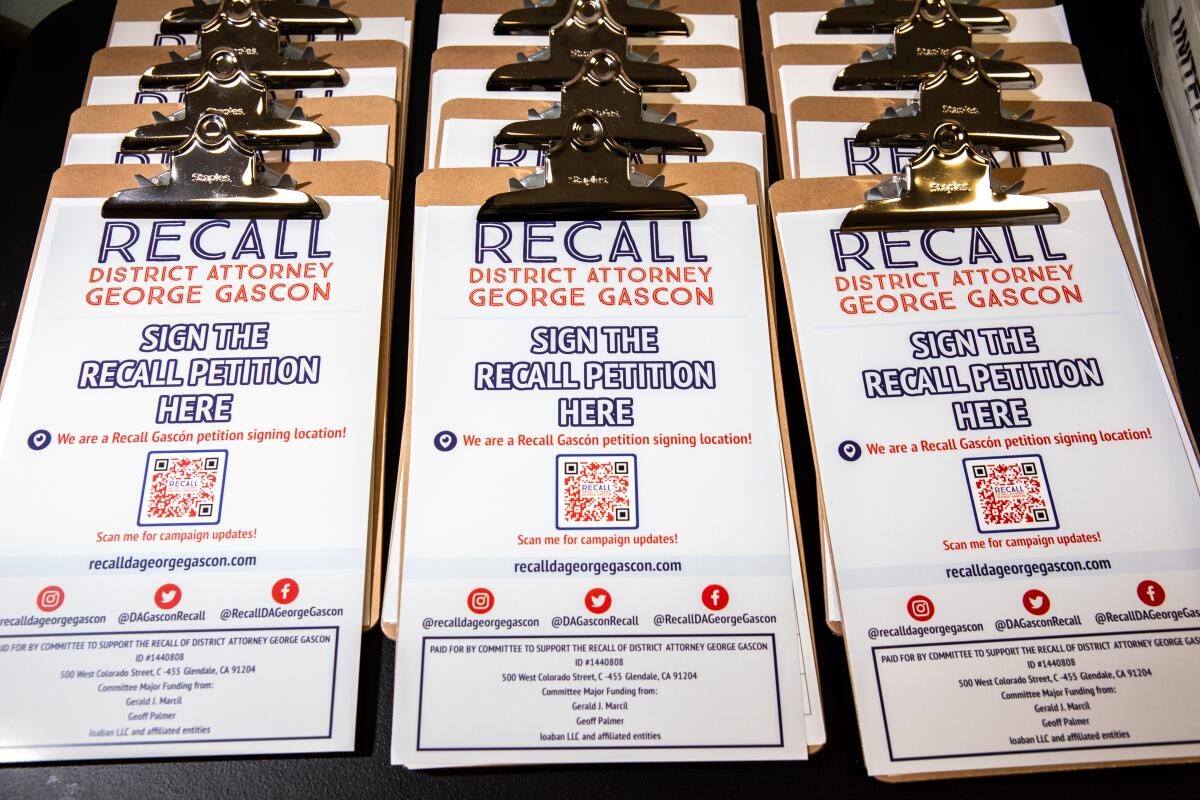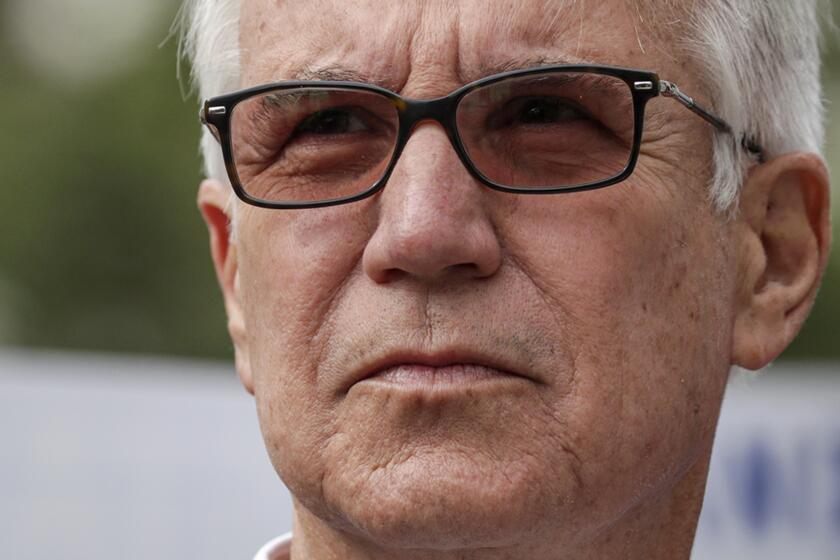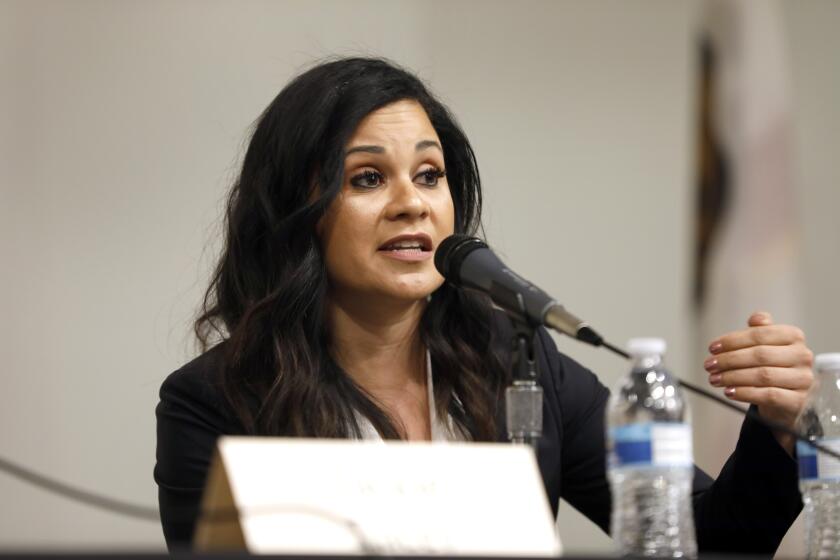The progressive prosecutor movement has limits. Public defenders can do more

- Share via
The appointment of Brooke Jenkins as San Francisco’s new district attorney culminates months of evidence that the criminal justice reform movement needs a new playbook.
Last month Jenkins replaced San Francisco’s reform prosecutor Chesa Boudin, who was recalled after 2½ years by a well-funded campaign portraying Boudin as harmful to “law and order.” Los Angeles County Dist. Atty. George Gascón, whose 2020 election was hailed as a major step forward for reform, could face a recall in November.
Such recalls are not the death knell of progressive prosecution that some are making them out to be. California voters backed other progressive candidates for law enforcement positions in the June primary, including Rob Bonta for California attorney general, Diana Becton for Contra Costa County district attorney, Pamela Price for Alameda County district attorney and Yesenia Sanchez for Alameda County sheriff. Last year’s attempt to recall Gascón didn’t gather enough signatures to go on the ballot.
The recall movement against Dist. Atty. George Gascón is a misguided attempt to assign blame for the last two years of political turmoil, disruption, anxiety and violence.
More broadly, however, these recalls underscore that the route to safer communities cannot run solely through progressive prosecutors.
A key goal of criminal justice reform is to address structural issues in the criminal legal system that over-incarcerate and disproportionately affect low-income people and communities of color, all while failing to prevent crime. Many change seekers have put their faith in progressive prosecutors to solve these problems by revising how people are charged with and penalized for crimes.
Yet even the most progressive prosecutors have limited tools for change. They can make temporary gains, like eliminating cash bail and restricting pretrial detention in the short term. But the expectations of prosecutors — whose jobs have long been understood as putting people in prison — make them vulnerable to law-and-order recall campaigns each election cycle. This helps status quo politicians like Jenkins, who plans to roll back Boudin’s reforms in favor of a tough-on-crime agenda (even though research indicates that such agendas often cause more crime than they deter).
A more sustainable tool for criminal justice reform — maybe our most powerful yet — is to invest in public defenders. Their jobs align more closely with the goals of reform and have the potential to lead to safer communities, yet they remain chronically underfunded.
Specifically, public defenders are court-appointed to represent some of the most vulnerable and poorest members of our society. The public defender’s office is thus an access point to government and community resources at the moment a person may need help most. A well-resourced defender can both keep people out of jail and meet their basic needs, ultimately addressing the issues that led them to the criminal legal system in the first place.
Rachel Rossi will lead the Justice Department’s office aimed at ensuring all people have access to legal counsel.
Take for example a near-blind elderly client who was arrested after five years of homelessness. The public defender’s office appointed to his case connected with a nonattorney client advocate from Partners for Justice, where I work, to help him secure affordable housing and stave off an eviction. His case required research on the client’s rights under federal housing and disability law, documentation of his health conditions and conversations with his eventual property manager and a local pastor. But with support and resources, the public defender’s team prevented this elderly man’s return to homelessness and jail, helping him become — and stay — housed. This collaborative defense work is public safety at its best.
In working with public defender’s offices across the country, my organization has used collaborative defense strategies to help clients avoid years of possible jail time. We have also connected over 5,000 clients with community-based social services and support. This amounts to millions in taxpayer savings.
Funds for collaborative defense are often underused. For example, state and local governments have broad discretion on how they spend federal criminal justice funding via Department of Justice grants. Yet one study found that in 2016 states allocated just $1.8 million from these grants to defense-related projects, less than 1% of available funds, compared to $17 million (about 9%) for prosecution projects.
Local governments could also be creative with funding not expressly allocated for criminal justice — such as by giving healthcare funds to defenders who connect people with mental health care and public benefits, or economic mobility grants to defenders who help people become and stay employed. Additionally, governments can adopt policies that ensure equitable funding between district attorneys and public defenders, as New Orleans did in its 2022 budget, or as proposed in the EQUAL Defense Act currently stalled in Congress.
Of course, some of our successes are the result of a well-resourced defender working with a progressive prosecutor, such as when a prosecutor’s office agrees to a proposal from defenders and advocates for the client to enter substance use treatment instead of jail. But we have seen successes in all sorts of regions, with many different kinds of prosecutors holding different political allegiances. The point is that meeting people’s most basic needs instead of putting them in prison helps communities thrive. And public defenders, not prosecutors, are uniquely positioned to do so.
As we saw during and after California’s primaries, crime remains a hot-button issue that will flare up throughout election season. But the progressive prosecutor movement alone cannot create meaningful change. If we want to build a safer and more just world, we must invest in those whose mission is already restoration rather than punishment.
Yonina Alexander is the regional program director for California at Partners for Justice.
More to Read
A cure for the common opinion
Get thought-provoking perspectives with our weekly newsletter.
You may occasionally receive promotional content from the Los Angeles Times.











